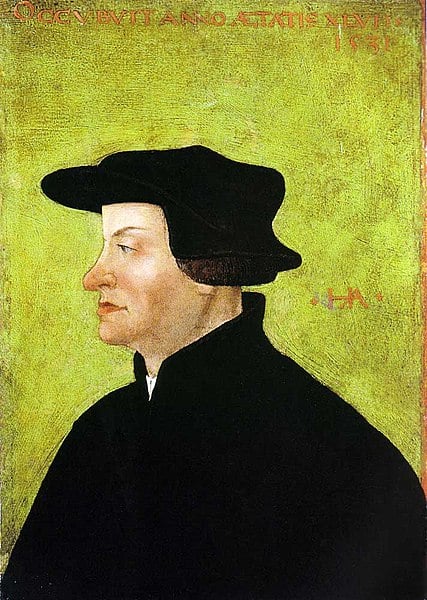Are We Never to Seek Intercessory Aid from Departed Saints or Even from Righteous People on the Earth?

I cite The Latin Works of Huldreich Zwingli, Volume Three, edited by Clarence Nevin Heller, Philadelphia: The Heidelberg Press, 1929. It contains Zwingli‘s work, Reply to Emser (20 August 1524), pp. 359 ff., which was translated by Professor George William Gilmore and revised by Heller. I am specifically addressing the section, “The Intercession of Saints” (pp. 382-388). Zwingli’s words will be in blue. I use RSV for biblical citations.
*****
I. God alone is good, Luke 18:19. (p. 382)
Jesus says there, “No one is good but God alone” but He means by that, that He is the ultimate source of good, because elsewhere he Himself refers to the “good man”:
Luke 6:45 The good man out of the good treasure of his heart produces good, and the evil man out of his evil treasure produces evil; for out of the abundance of the heart his mouth speaks.
II. From this one and only source one must derive whatever good is needed. For every good and perfect gift is from above, coming down from the Father of lights, James 1:17. (p. 382)
This is true, but not in an exclusive sense. Again, God is the ultimate source of all good, but we can receive good things from human beings as well:
Psalm 34:14 Depart from evil, and do good; . . .
Isaiah 1:17 learn to do good; seek justice, correct oppression; defend the fatherless, plead for the widow.
Mark 14:7 For you always have the poor with you, and whenever you will, you can do good to them; but you will not always have me.
Luke 6:27 . . . Love your enemies, do good to those who hate you, (cf. 6:33, 35)
Galatians 6:6, 10 Let him who is taught the word share all good things with him who teaches. . . . [10] So then, as we have opportunity, let us do good to all men, and especially to those who are of the household of faith.
1 Thessalonians 5:15 . . . always seek to do good to one another and to all.
1 Timothy 6:18 They are to do good, to be rich in good deeds, liberal and generous,
Hebrews 13:16 Do not neglect to do good and to share what you have, for such sacrifices are pleasing to God.
III. The faithful are distinguished from the unfaithful by this mark: the faithful depend upon this One and Only Good, cling to Him alone, resort to Him alone, draw from Him alone; (p. 383)
Ultimately yes, but we also depend upon good and trustworthy and righteous human beings, who are simply spreading God’s grace and His love as His instruments or as “God’s fellow workers” (1 Cor 3:9). St. Paul expressed perfectly how we work with God to accomplish His will: “But by the grace of God I am what I am, and his grace toward me was not in vain. On the contrary, I worked harder than any of them, though it was not I, but the grace of God which is with me” (1 Cor 15:10). Paul refers to “Working together with him” (2 Cor 6:1) and writes, “God is at work in you, both to will and to work for his good pleasure” (Phil 2:13), and refers to “always abounding in the work of the Lord” (1 Cor 15:58).
on the contrary, the unfaithful turn from the Creator to creatures, depend upon them, and hope for aid from them. (p. 383)
There is northing whatsoever wrong with this, as long as it’s not in a sense that excludes or replaces God (idolatry).
The only faithful ones, then, are those who are so filled with the knowledge that they are God’s that they do not even name any father except the Almighty Father, so far are they from having hope in another. . . . especially since the Master forbids us to call any man father on the earth? Matt 23:9. (p. 383)
Jesus was making the point that God the Father is the ultimate source of all authority. He said this during the course of rebuking the Pharisees for spiritual pride (Mt 23:2-10). Those who try to reason in this way neglect to see that it would prohibit all uses of the word father whatsoever; even biological fathers. Since that is an absurd outcome, it is clear that the statement cannot be taken in an absolute sense.
Accordingly, Jesus refers to Abraham as “father” twice (Lk 16:24; Jn 8:56)? And Stephen (Acts 7:2), Paul (Rom 4:12, 16). and James (Jas 2:21) do the same thing. Even God called Abraham “the father of many nations” (Rom 4:17). Paul refers to “our forefather Isaac” (Rom 9:10) and described himself as the “father” of the Corinthians (1 Cor 4:15) and to Timothy (Phil 2:22). Zwingli seems only minimally acquainted with Scripture. Yet he fancied himself a great Christian leader.
Furthermore, he departs from the Lord who seeks elsewhere than with Him for the good which he needs . . . (p. 383)
This is the typical extreme Protestant “dichotomous” / “either/or” mindset. In the Bible, people can act on behalf of God. It’s not “either/or” (i.e., “if we ask a man for help, we are denying that God is our help and the ultimate source of all good”).
There is no reason for lack of faith to make for itself this excuse: “Of course, I know that all my hope rests in God; but yet I have need of advocates to commend
me to that most high God.” From its own words one can easily judge what it is that thus speaks, namely, lack of faith. Since you say, “I know that all my hope rests in God,” why do you not in all adversities flee to Him? . . . Nor is there any reason for your giving me the everlasting reply, “I need intercessors with the Son.” The fact is, you are not willing to see that He Himself came down for the purpose of making clear how completely the opposite of inaccessible He is. . . . For if a way of approach to God is open by means of so many different advocates (which is the common pernicious belief), then Christ died in vain; He is not the only mediator, the only way; coming to the Father will be elsewise than by the Son; deceitfully He said: “Come unto me all ye that labor,” etc. How blasphemous this is, how impious, ungrateful, and pernicious, no one can adequately describe. (p. 385)
The only problem with all of this analysis is that it is utterly unscriptural. The Catholic and biblical position is that it’s best, and always possible, to “go straight to God” in prayer, unless there happens to be a person more righteous than we are in the immediate vicinity, who is willing to make the same prayer request. Then the Bible — not merely the Catholic Church — recommends that we ask them to intercede, rather than asking God directly.
If someone wants to be biblical and to follow the biblical model of prayer and intercession, it would include this practice. Why do we go to others holier than us, and ask them to intercede? Again, because this is what the Bible teaches. First of all, it expressly commands us to go to the elders of the church and to ask them to pray for us if we are sick or have committed sins:
James 5:14-15 Is any among you sick? Let him call for the elders of the church, and let them pray over him, anointing him with oil in the name of the Lord; [15] and the prayer of faith will save the sick man, and the Lord will raise him up; and if he has committed sins, he will be forgiven.
Immediately after this in the same passage, we learn about the exceptional power of prayer by holy people:
James 5:16-18 . . . The prayer of a righteous man has great power in its effects. [17] Eli’jah was a man of like nature with ourselves and he prayed fervently that it might not rain, and for three years and six months it did not rain on the earth. [18] Then he prayed again and the heaven gave rain, and the earth brought forth its fruit. (cf. 1 Kgs 17:1)
Anyone can go directly to God in prayer at any time. The Catholic Church has never stated otherwise. But they can also choose to wisely ask a person holier than themselves to make a prayer request of God, because of the passages above, and others such as: “the eyes of the Lord are upon the righteous, and his ears are open to their prayer” (1 Pet 3:12), and “When the righteous cry for help, the LORD hears” (Ps 34:17), and “the prayer of the upright is his delight” (Prov 15:8), and “he hears the prayer of the righteous” (Prov 15:29), and “we receive from him whatever we ask, because we keep his commandments and do what pleases him” (1 Jn 3:22), and “If I had cherished iniquity in my heart, the Lord would not have listened” (Ps 66:18; cf. 66:19-20).
Having established this principle of scriptural and efficient, spiritually wise prayer, we see how it is carried out in the case of very holy people. God told Abimelech that Abraham would pray for him, so he could live, “for” Abraham was “a prophet” (Gen 20:6-7). “All Israel” (1 Sam 12:1) “said to Samuel [the prophet], ‘Pray for your servants to the LORD your God, that we may not die’. . .” (1 Sam 12:19). God told Job’s “friends”: “my servant Job shall pray for you, for I will accept his prayer not to deal with you according to your folly” (Job 42:8).
Why did God listen to Job’s prayers? It’s because God Himself stated that “there is none like” Job “on the earth, a blameless and upright man, who fears God and turns away from evil” (Job 1:8). King Zedekiah asked the holy prophet Jeremiah to pray for him and the country (Jer 37:3; cf. 42:2: “[they] said to Jeremiah the prophet, ‘Let our supplication come before you, and pray to the LORD your God for us’ “).
If we go to a more righteous or holy person and ask them to pray for x, then x is far more likely to happen than if we go to God directly (because we are less righteous). Therefore, it’s more “efficient” and “better” to do this in these instances rather than go directly to God. Righteous people know God’s will better than those who are not following God with a whole heart, with all their might. Therefore, their prayers are more effective. Here are many more passages that teach this principle of prayer:
Exodus 32:30 On the morrow Moses said to the people, “You have sinned a great sin. And now I will go up to the LORD; perhaps I can make atonement for your sin.”
Deuteronomy 9:18-19 Then I lay prostrate before the LORD as before, forty days and forty nights; I neither ate bread nor drank water, because of all the sin which you had committed, in doing what was evil in the sight of the LORD, to provoke him to anger. [19] For I was afraid of the anger and hot displeasure which the LORD bore against you, so that he was ready to destroy you. But the LORD hearkened to me that time also.
Deuteronomy 10:10 I stayed on the mountain, as at the first time, forty days and forty nights, and the LORD hearkened to me that time also; the LORD was unwilling to destroy you.
2 Kings 6:18 And when the Syrians came down against him, Eli’sha prayed to the LORD, and said, “Strike this people, I pray thee, with blindness.” So he struck them with blindness in accordance with the prayer of Eli’sha.
2 Chronicles 30:18-20 . . . Hezeki’ah had prayed for them, saying, “The good LORD pardon every one [19] who sets his heart to seek God, the LORD the God of his fathers, even though not according to the sanctuary’s rules of cleanness.” [20] And the LORD heard Hezeki’ah, and healed the people.
That’s an awful lot of Scripture for a Christian so-called “reformer” to be ignorant of. Because he seems to be unaware of all this, he goes on to teach absurd and woefully unbiblical things.
I plead by Holy Writ, . . . (p. 386)
Well, no he doesn’t, because he doesn’t even seem to be aware of the many ultra-relevant biblical passages that I have brought to bear. He’s in his own little highly selective, cherry-picking proof text bubble, like so many Protestant apologists.
The other passage is: “Remember Abraham, Isaac, and Jacob,” etc. [Exod. 23: 13], where at first he did not notice that “O God, remember Abraham, Isaac, and Jacob, to whom thou swarest” and “Abraham, intercede for us” are by no means equivalent, since the former is said to God, that He may deign to bless the
children of Israel for the sake of the fathers, whereas the latter would be said to Abraham, though it is found nowhere in Holy Writ. (p. 387)
Actually, the latter (prayer to Abraham, generally speaking) is in Scripture, taught by our Lord Jesus Himself but once again, Zwingli is ignorant of it. The story Jesus told involves someone praying or making an intercessory request of someone other than God:
Luke 16:24 And he called out, ‘Father Abraham, have mercy upon me, and send Lazarus to dip the end of his finger in water and cool my tongue; for I am in anguish in this flame.’
Abraham says no (16:25-26), just as God will say no to a prayer not according to His will. He asks him again, begging (16:27-28). Abraham refuses again, saying (16:29): “They have Moses and the prophets; let them hear them.’” He asks a third time (16:30), and Abraham refuses again, reiterating the reason why (16:31).
How this supposedly does not support the principle of saints interceding and being able to intercede is a mystery to me. If we were not supposed to ask saints to pray for us, I think this story would be almost the very last way to make that supposed point. Abraham would simply have said, “you shouldn’t be asking me for anything; ask God!” In the same way, analogously, angels refuse worship when it is offered, because only God can be worshiped (Rev 19:9-10; 22:8-9). St. Peter did the same thing (Acts 10:25-26); and St Paul and Barnabas did, too (Acts 14:11-15).
If the true theology is that Abraham cannot be asked an intercessory request, then Abraham would have noted this and refused to even hear it. But instead he heard the request and said no. Jesus couldn’t possibly have taught a false principle. It’s not that Abraham couldn’t intercede (if that were true, he would have said so and Jesus would have made it clear), but that he wouldn’t intercede in this instance (i.e., he refused to answer the request). Refusing a request is not the same thing as not being able to grant the request. Otherwise, we would have to say that God is unable to answer a prayer request when He refuses one.
Game, set, match, right in the Bible, from Jesus Himself. But those who place man-made traditions about Holy Scripture will always think they can find a way to weasel their way out of plain biblical teaching. It’s sad. Luke 16 has to do with two major prior premises in the larger debate of intercession of the saints:
1) Is it proper to “pray” to anyone but God?,
and
2) is it proper to ask anyone but God to not only pray for, but fulfill (i.e., have the power and ability to bring about) an intercessory request?
Protestantism utterly rejects #1 and #2 above; yet Luke 16 (from Jesus) clearly teaches them. Hence lies the dilemma. It matters not if both men are dead; the rich man still can’t do what he did, according to Protestant categories of thought and theology. Whether Dives [the “rich man”] was dead or not is irrelevant, since standard Protestant theology holds that no one can make such a request to anyone but God. He’s asking Abraham to send Lazarus to him, and then to his brothers, to prevent them from going to hell. That is very much prayer: asking for supernatural aid from those who have left the earthly life and attained sainthood and perfection, with God. . . .
Jesus told this story, and it has a guy praying to a dead man, to request things that the dead man appears to be able to fulfill by his own powers (themselves no doubt delegated by God). That is quite sufficient to prove the point. . . . It remains true that Protestant theology, generally speaking, forbids asking a dead man to intercede (thus, a dead man asking this is part of the larger category that remains forbidden in that theology), and makes prayer altogether a matter only between man and God . . .
In fact, God is never mentioned in the entire story (!!!) . . .
So why did Jesus teach in this fashion? Why did He teach that Dives was asking Abraham to do things that Protestant theology would hold that only God can do? And why is the whole story about him asking Abraham for requests, rather than going directly to God and asking Him: which would seem to be required by [Protestant] theology? . . .
This just isn’t how it’s supposed to be, from a Protestant perspective. All the emphases are wrong, and there are serous theological errors, committed by Jesus Himself (i.e., from the erroneous Protestant perspective).
Moreover, there is a sense in the Bible in which it is irrelevant whether a human being is dead or not. They are still conscious and alive (Mt 22:32) and bound to God’s laws. So, for example:
Philippians 2:10-11 . . . at the name of Jesus every knee should bow, in heaven and on earth and under the earth, [11] and every tongue confess that Jesus Christ is Lord, to the glory of God the Father.
Revelation 5:3 And no one in heaven or on earth or under the earth was able to open the scroll or to look into it,
Revelation 5:13 And I heard every creature in heaven and on earth and under the earth and in the sea, and all therein, saying, “To him who sits upon the throne and to the Lamb be blessing and honor and glory and might for ever and ever!”
Today also those are deservedly counted among the faithless who call for aid upon others than the one and only God. (p. 388)
Numbers 11:2 Then the people cried to Moses; and Moses prayed to the LORD, and the fire abated.
Numbers 14:13, 19-20 But Moses said to the LORD, “ . . . [19] Pardon the iniquity of this people, I pray thee, according to the greatness of thy steadfast love, and according as thou hast forgiven this people, from Egypt even until now.” [20] Then the LORD said, “I have pardoned, according to your word;
1 Samuel 7:8 And the people of Israel said to Samuel, “Do not cease to cry to the LORD our God for us, that he may save us from the hand of the Philistines.”
1 Samuel 12:18-19 So Samuel called upon the LORD, and the LORD sent thunder and rain that day; and all the people greatly feared the LORD and Samuel. [19] And all the people said to Samuel, “Pray for your servants to the LORD your God, that we may not die; for we have added to all our sins this evil, to ask for ourselves a king.”
1 Kings 13:6 And the king said to the man of God, “Entreat now the favor of the LORD your God, and pray for me, that my hand may be restored to me.” And the man of God entreated the LORD; and the king’s hand was restored to him, and became as it was before.
This is calling upon God; it simply goes through a holy person, because their prayers are much more powerful and — shall we say? — efficient (so James informs us). The people begged the prophet Samuel, “Do not cease to cry to the LORD our God for us” and “Pray for your servants to the LORD your God.” It’s all directed to Him.
The fuller intercession of saints involves those who are departed and in heaven. They are more alive than we are, and are perfected and aware of earthly happenings. They have extraordinary qualities granted to them from God. I’ve made scores of biblical arguments about many aspects of these things on my Saints, Purgatory, & Penance web page.












